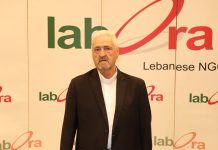Aoun’s playing a dangerous game of brinkmanship
Michael Young/The National/October 14/15
It was of questionable judgement for Michel Aoun to organise a triumphalist political rally last Sunday near Lebanon’s presidential palace in the Beirut suburb of Baabda. A quarter of a century ago, the palace was the site of Mr Aoun’s ignominious defeat at the hands of Syria’s military, from whom he fled to the safety of the French embassy. Much has changed since then. Mr Aoun is now politically allied with the Syrian regime and Hizbollah. In 1989, as commander of the army and head of a military government, Mr Aoun embarked on a so-called “war of liberation” to force Syria to withdraw its army from Lebanon. He failed when, on October 13, 1990, the Syrians bombed him out of the presidential palace.
And yet some things have not changed. Just as Mr Aoun sought to manipulate the anti-Syrian rallies of 1989-90 to bring about his election as president of Lebanon, so too, last weekend, did he view his march in Baabda as leverage to be elected. This determination has effectively blocked the Lebanese political system since May 2014. Unless guaranteed of winning the vote beforehand, Mr Aoun has prevented a quorum in parliament to elect a new president. He has also hindered cabinet work, arguing that as the Maronite Christian presidency is vacant, Christian ministers collectively represent him, therefore all government decisions must be taken by unanimity.
Mr Aoun’s obstructionism notwithstanding, he has been supported in his efforts by Hizbollah, which has publicly said it backs him for the presidency. While some have argued the party is leading Mr Aoun on in pursuit of its own agenda, the reality is more nuanced. Hizbollah not only regards Mr Aoun as a politician who will defend its interests, it may well believe he will work to amend the constitution to the Shias’ advantage. Both Hizbollah and Mr Aoun feel now is the time to benefit from the recent nuclear accord with Iran.
They have, rightly, interpreted the deal as a boost for the Islamic Republic, shifting the balance of power in the region to its benefit. Therefore, they believe, this balance must be reflected in Lebanon through a pro-Hizbollah president and, very probably, a constitutional order that can secure and expand Shia gains.
While Hizbollah has not openly defined its aims, party officials have long talked about an overhaul of the sectarian political system. According to Lebanon’s 1989 constitution, agreed in the Saudi resort of Taif, representation in parliament, the government and the civil service is 50-50 between Christians and Muslims. However, some Shia politicians have indicated that Hizbollah wants to put in place a system of thirds: a third for the Shia, a third for Sunnis and a third for Maronite Christians, with smaller communities receiving shares within this framework. Mr Aoun appears to agree with this. While Christians would lose representation through such a scheme, the rationale of Mr Aoun and his son-in-law, foreign minister Gebran Bassil, is that many Christian parliamentarians and ministers are already appointed or brought to office by Muslim politicians, therefore the reduction in representation would not be a net loss for communal influence.
More important, to Mr Aoun and Mr Bassil, a structural majority of the Christians who back him and Shia would maintain Sunnis at a permanent disadvantage. This reflects their innate fear of Sunnis, whom they regard as oppressors of regional minorities. The crude judgement has gained traction as the war in Syria has allowed jihadi groups to proliferate. It also explains Mr Aoun’s sympathy for Syrian president Bashar Al Assad. While Mr Aoun is over 80, Mr Bassil’s recent elevation to the post of president of the Free Patriotic Movement, Mr Aoun’s political party, opens up new possibilities for Hizbollah. Mr Aoun recently averted an FPM election he knew Mr Bassil would lose and, instead, imposed his victory undemocratically. Left unsaid is that if Mr Aoun were to die before becoming president, Hizbollah would probably shift its support to Mr Bassil. It has been a strange path for Mr Aoun. He has been most responsible for perpetuating the debilitating political vacuum since May 2014.
While claiming to defend Lebanese sovereignty, he has partnered with a party, Hizbollah, that has created a state-within-a-state in Lebanon.
While purporting to be above sectarian calculations, Mr Aoun has behaved in the most narrowly sectarian of ways, indifferent to the polarisation he has exacerbated, greatly harming Christian-Sunni relations in particular.
Indeed, Sunni rejection of him, both in Lebanon and among the Sunni-majority Arab states, is now Mr Aoun’s greatest barrier to getting elected.
Mr Aoun’s brinkmanship will continue and he will not relent until he is voted into office. Yet Mr Aoun’s red lines are defined by Hizbollah, which will back him to the hilt, but does not want Lebanon to be dangerously destabilised as a consequence. However, as Mr Aoun showed in 1990, in pursuit of the presidency, destructive inconsistency is no vice.
**Michael Young is opinion editor of The Daily Star in Beirut
Lebanon’s wet nightmare
Alex Rowell/Now Lebanon/October 14/15
With huge quantities of garbage still strewn, uncollected, across the valleys, riverbanks, and roadsides of Beirut and Mount Lebanon as a result of the months-long waste disposal crisis, environmental experts have been warning for some time that the advent of the winter rain season could spark a grave health crisis, as showers drive pollutants from exposed trash into the groundwater, contaminating household water supplies. Following several rains in the past fortnight, some of them heavy, fears have been voiced by some specialists that damage may already have been done to water quality. The rock that forms Lebanon’s terra firma is highly permeable, meaning liquid on its surface absorbs comparatively quickly into the groundwater.
However, one governmental organization tasked with, among other things, monitoring water quality told NOW Tuesday that there was not yet any cause for concern above and beyond that which existed before the garbage crisis. “Currently, we don’t have evidence of [further] contamination,” said Dr. Paul Said, head of the laboratory department at the Establishment of the Water of Beirut & Mount Lebanon (EBML). “We are observing everything, and nothing has changed.”Which is not to say the water is free from any pollutants. Said told NOW that untreated water coming out of many natural springs at present is highly contaminated – and the problem is getting worse. “In some springs the contamination started to double […] we even found a new kind of bacteria that was not known before.” Disconcerting as that may sound, water quality expert Dr. May Jurdi of the American University of Beirut’s Environmental Health Department told NOW the state of untreated spring water mattered little, because the water used in households was almost entirely treated by chlorine.
“The water which is being pumped [goes through] pumping stations and water treatment plants, and disinfection by chlorination,” said Jurdi. “The water you get [is] treated, mostly, it’s not the water you get directly [e.g. from a spring].”Dr. Said, however, countered that chlorination itself carries potentially severe health risks. “If you want to increase the chlorine percentage then you will be using a cancerous substance in water,” Said told NOW. “This is our grave concern that we hope we will not reach.” There are cases, Said added, where chlorine has already been applied at what the EBML considers the maximum safe dosage, and the water has either had to be treated with other, less effective means, such as flocculation, or simply not used.
The potentially more serious hazard, however, said Jurdi – echoing what environmentalists have told NOW previously – is that of “leaching;” that is, of the rainwater mixing with toxic chemicals as it passes through the garbage and thus dragging them into the groundwater once absorbed. “I’ll be worried later on about the increase in the leaching of chemical substances, because rain is like a weak acid, and if you have all the trash scattered around, it may leach some of this,” said Jurdi. On the one hand, contrary to some reports that this prospect poses an immediate danger to the water supply, Jurdi told NOW it would take “years” for the leached chemicals to accumulate to a hazardous extent.
By the same token, however, any leachate that did make it into underground aquifers would also take a long time to be rooted out, according to Dr. Christian Khalil, assistant professor of environmental toxicology at the Lebanese American University.“The leachates (cocktails of chemicals and heavy metals) will have the potential to get to underground water,” said Khalil in an email to NOW. “This will spell disastrous consequences as the underground water, due to its low flow and not being exposed to sunlight, does not have the capacity to break down some of these chemicals and heavy metals. Contaminating the aquifers will take many, many, many years to be naturally purged and will definitely affect the quality and safety of drinking waters for years to come.”
Even where leachate doesn’t make it into the groundwater, such as largely concrete Beirut, its effects may plague Lebanon for a similar length of time in all kinds of other ways, Khalil added. “[In Beirut] the majority of contaminants will be transported mainly by surface water and end up in the Mediterranean Sea. That will be the main challenge, as the contaminants will become bioavailable and will biomagnify as they move up in the food chain. They will accumulate in the sediments. Future catches of fishes will have very high heavy metal and chemical concentrations, potentially posing risks to human health. […] The leachates from [the] Naameh landfill [are] already being trucked out and dumped off the coast of Beirut in Karantina, creating an environmental time bomb for people catching fish in the areas or in neighboring areas.”Unless and until the waste disposal crisis is resolved, and in the absence of municipal action, Dr. Said proposes that citizens take it upon themselves to ensure that garbage is removed from areas most susceptible to water immersion. “The solution is to protect the sources of water – to clean up and clear around the wells, springs, and irrigation canals,” he told NOW.
Otherwise, “God knows what will happen next.”
Alex Rowell tweets @disgraceofgod/Amin Nasr contributed reporting.




















